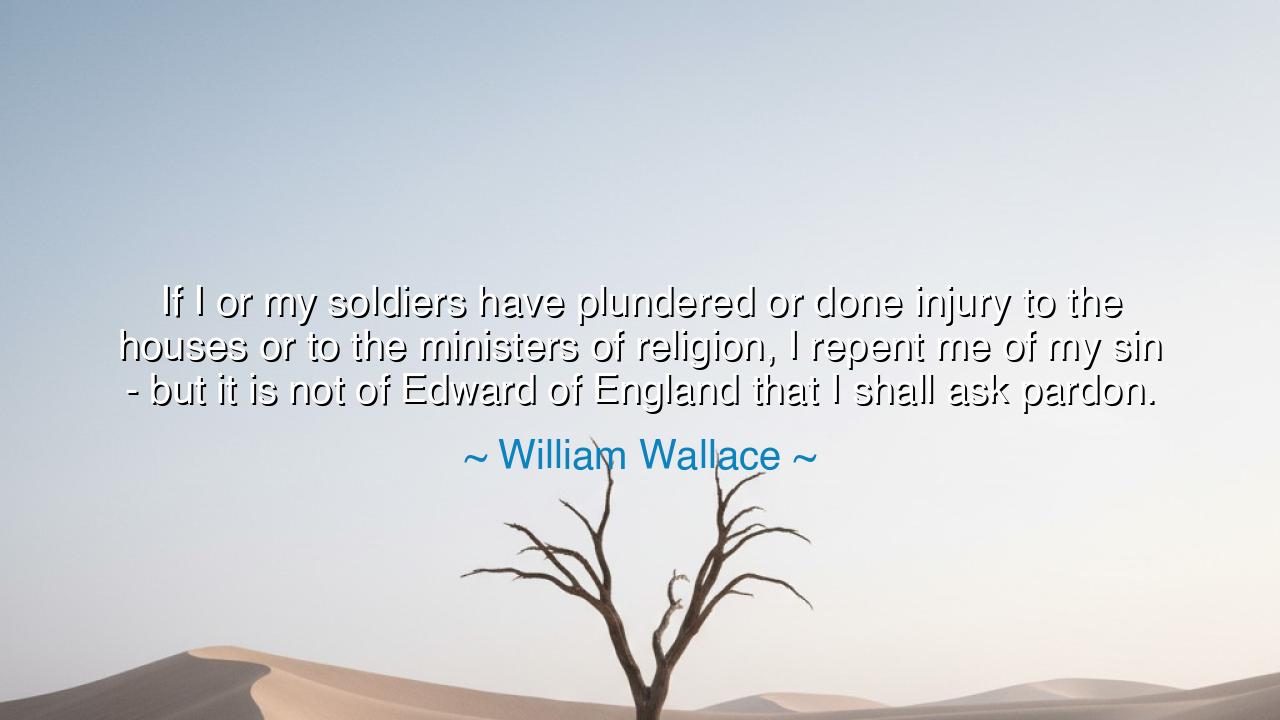
If I or my soldiers have plundered or done injury to the houses
If I or my soldiers have plundered or done injury to the houses or to the ministers of religion, I repent me of my sin - but it is not of Edward of England that I shall ask pardon.






"If I or my soldiers have plundered or done injury to the houses or to the ministers of religion, I repent me of my sin - but it is not of Edward of England that I shall ask pardon." These words, spoken by William Wallace, resonate with a profound sense of duty, honor, and uncompromising resolve. Wallace, the Scottish freedom fighter and symbol of resistance against English tyranny, declares that while he is willing to seek forgiveness for any wrongs committed in the pursuit of his cause, he will not apologize for fighting against the oppressive forces of Edward of England. This statement is a declaration of the primacy of justice over the moral expectations imposed by a corrupt system. Wallace's refusal to ask for forgiveness from Edward highlights the moral clarity that comes with fighting for freedom and the sacred duty to resist oppression.
The origin of this sentiment can be found in the ancient traditions of justice and honor, where the act of defending the oppressed was considered not only a right but a sacred duty. The Greeks understood the idea of honor as something sacred, something that transcended personal desires or the laws of tyrants. Socrates himself, standing on trial for his life, refused to submit to the unjust demands of his accusers. His defense was rooted in the belief that the higher truth of justice must never be sacrificed for the whims of the state. Likewise, Wallace’s statement can be seen as a declaration of his unwavering commitment to the truth of his cause, no matter the consequences.
Consider the story of Hannibal, the Carthaginian general who, in his pursuit of justice and the defense of his homeland, led his army across the Alps to confront the Romans. While he engaged in ruthless warfare, his ultimate goal was the freedom and sovereignty of Carthage, not personal gain or power. Hannibal, like Wallace, made hard choices in the name of justice and liberation. He did not seek forgiveness from the Romans, for he understood that the greater moral imperative of his mission transcended the temporary discomfort or damage caused during the course of war. His story demonstrates the brutal but necessary reality of resisting oppression — sometimes, the path of justice is fraught with difficult decisions and hard truths.
In the same way, Wallace’s refusal to apologize to Edward for the destruction of religious institutions highlights the tension between higher principles and earthly powers. In medieval Europe, the church held immense power, and religious institutions were often protected under the guise of divine authority. However, Wallace understood that the defense of his people and freedom took precedence over the dictates of an oppressive religious or political system. His loyalty to his people, to Scotland, was far stronger than any obligation to the institutions that served the tyrant Edward. This reflects the ancient belief in self-determination — that the sacred duty to one’s homeland and freedom outweighs any allegiance to the forces that seek to suppress it.
Wallace’s words also reflect a deep understanding of moral clarity in the face of complexity. To seek forgiveness from a tyrant like Edward would be to legitimize the very system that had caused so much suffering for the Scottish people. Mahatma Gandhi, in his own fight for freedom against British colonial rule, refused to submit to the British authorities, not because he sought personal power, but because he understood that true freedom could only be won through resistance to injustice. Like Wallace, Gandhi believed that justice and self-determination were higher than any obligation to an oppressive regime, even if that meant bearing the weight of suffering or sacrifice.
The lesson here is one of unwavering commitment to justice, no matter the personal cost. Wallace’s refusal to ask for forgiveness from Edward teaches us that in the face of oppression, the moral imperative to fight for freedom and truth must outweigh any personal fears or the pressures of conforming to the status quo. When the ruling powers are unjust, when they use religion, race, or politics to legitimize tyranny, we must have the courage to stand up against them. Moral clarity in these moments is not about seeking the approval of corrupt systems, but about aligning oneself with the greater good — the good of the people, of freedom, and of truth.
To apply this wisdom in our own lives, we must cultivate the strength to challenge injustice when we see it, even if it means standing alone or facing adversity. Just as Wallace did, we must examine our choices and commit ourselves to the greater cause of freedom and justice, knowing that the path of righteousness is often fraught with difficult decisions and personal sacrifice. In our world today, this might mean standing up against oppressive regimes, discriminatory practices, or unjust policies, regardless of the pressure to conform or compromise. Let us follow the example of William Wallace, knowing that true honor and justice are not found in seeking forgiveness from the powerful, but in unwaveringly pursuing what is right, even at great personal cost.






AAdministratorAdministrator
Welcome, honored guests. Please leave a comment, we will respond soon